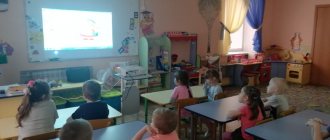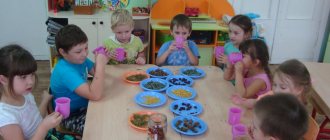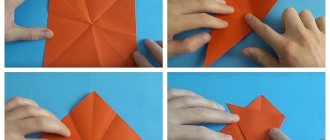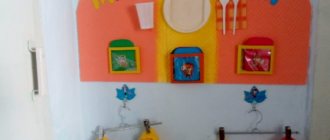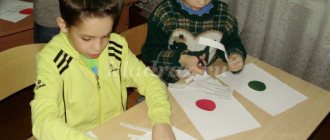Psychologists assure that it is difficult to find people who do not have bad habits. Often a person doesn’t even notice how he rocks in his chair, snaps his fingers, chews a pencil, uses filler words, and doesn’t attach much importance when obscene words slip into his speech. Such actions seem quite harmless and do not cause much inconvenience to others. However, experts draw attention to the fact that they negatively affect the physical and psychological state, are reflected at the cultural level, and determine a person’s position in society. It is necessary to take into account that any habits are formed in childhood and gradually become behavior patterns; it is not for nothing that the proverb says that habit is second nature to a person. Caring parents, understanding this, try to raise their child in such a way as to instill as many positive skills as possible. Therefore, it is useful to know how bad habits appear in children and how to eliminate them if they are already entrenched in behavior.
If a child has developed a habit...
The word “habit” (from the English “habit”) means a tendency to do something that has become permanent, habitual.
According to experts, any habit (both good and bad) is formed gradually, when its action is repeated day after day, reinforced and becomes a ritual. Usually this happens against some psychological background - positive or negative. For example, this is how psychologists explain how children become accustomed to unwanted actions: against the background of a lack of parental attention, the child begins to suck his finger or bite his nails, calming himself in a similar way. Gradually, with any stress or shock, the child, like a straw, grabs his finger. The same formation mechanism is characteristic of other harmful skills.
What are bad habits?
The most common habits in children, seemingly harmless, but unpleasant for others, include such habits as the desire to constantly bite nails, chomping while eating, rhinotillexomania (the habit of picking the nose), sniffing, grimacing, rocking in a chair, twisting hair on the finger, fiddling with one’s own or an interlocutor’s clothing, filler words in speech, scratching, manipulating intimate parts of the body and similar actions. Psychologists consider every bad habit a compensatory mechanism that helps children overcome fear, anxiety, depression, and lack of parental love and care. Often adults themselves shape children into unwanted skills. For example, the family does not observe table manners, and the child, imitating loved ones, behaves in a similar way: he gets used to wiping his mouth with his palm, eating any food only with a spoon, slurping, talking loudly or being capricious at the table, and so on. Unfortunately, many bad habits have an impact on a child's health. Not only do they look unattractive, but they can also have negative consequences. For example, a child biting his nails can infect himself with worms; tugging at your face inflames the skin; Watching TV while eating has a detrimental effect on the digestive system and can even lead to obesity. Any specialist will confirm that a bad habit directly or indirectly has a detrimental effect on the condition of children.
How to deal with bad habits in children
Everyone knows that a disease is easier to prevent than to cure. The same warning applies to a bad habit. Experts say that unwanted actions are easier to prevent, and for this, it is useful for parents to find out what measures to prevent negativity can be used at home. The main thing is to take into account that solving this problem requires certain efforts and close attention not only from the parents, but also from all the people around the child. After all, a psychological feature of preschool children is the rapid adaptation to the existing way of life, imitation of those people who are authoritative for them, be it an adult or a peer. It is this feature of children that can become the main support in preventive work. It will be easiest for parents to use those techniques that are successfully used in children's institutions. These are games and exercises, active communication and positive role models, reading fairy tales and watching cartoons, conversations and stories, creative activities.
Important: it is useless to look for any special ways to combat unwanted manifestations in preschool children. The recipe is simple: instill in your child useful skills and abilities as early as possible, on the basis of which useful habits will be formed. They will not only make the baby’s life easier, but will also give him the opportunity in the future to take a worthy position among his peers, fully communicate with others, and not be ashamed of any negative inclinations.
What do experts recommend to parents to teach their children to break bad habits?
Games and exercises
The main activity for preschoolers is play, so play activities help to unobtrusively tell children about bad habits, laugh at characters who have them, introduce them to useful skills, and reason about how to behave correctly in a given situation. Parents can use the games that experts offer, or they can come up with interesting game tasks and exercises based on them. For example,
Game "Two Tracks"
The purpose of such a game is to relieve the nervous tension that children often experience, as a result of which habits are born. In this game, an adult invites the child to look at a picture with red (useful) and gray (harmful) paths diverging in different directions. Apple trees grow along the paths. The adult names a certain action, and the child must correctly hang the apples (cut out circles of red and gray): red ones - on a tree with good habits, gray ones - on a tree with bad habits. To maintain interest, you can select pictures with appropriate behavior patterns:
"Healthy apples"
- brush your teeth
- Wash your face often
- Wash and bathe
- Don't be late for kindergarten
- Put away your toys
- Hang your clothes neatly
- Do physical exercises
- Wipe your mouth with a napkin
- Use a fork and knife correctly
- Say hello and goodbye
- Thank adults and other children
- Helping women carry bags
- Let elders and girls go first
- Give way to elders
"Bad Apples"
- Scatter toys
- Constantly watching TV
- Talk while eating
- Spitting food
- Nail biting
- suck fingers
- Rock on a chair
- Tugging on clothes
- Be unkempt
- Taking someone else's property without asking
- Make a mess
- Throwing away your clothes
- Pushing babies
- Be rude to elders
Game exercise “Say a word”
In the game, it is important to correctly identify and reinforce positive actions. The adult begins the phrase, and the child continues:
- To avoid collecting dirt, your nails must be... (trimmed).
- Even little pigs love to clean... (ears).
- It’s not too lazy to wash your feet and hands in the shower with a sponge every... (day).
- For a neat hairstyle, we always wear ... (combs).
- You decided to become healthy, which means you followed ... (regime).
- I always walk around dirty, I’m not friendly with soap and a brush. And isn’t that why everyone calls me... (dirty).
- I love to eat hearty, plentiful, tasty, appetizing food. I eat everything indiscriminately, because I... (glutton).
- I throw things everywhere and can’t find them. Where are the pants? Where's the shirt? I don't know. I am... (slob).
- We all love to wash ourselves and dress neatly. Sun, air and water - ... (our best friends).
- If you want to be healthy, strong, strong and cheerful, quickly burn your bad habits like ... (matches).
This exercise can be enriched by playing with a ball: an adult reads the beginning of the verse and throws the ball to the child. He finishes the sentence and returns the ball.
Poems and riddles
The artistic word occupies a large place in a child’s life. Everyone knows how little children love to have books read to them, easily remember funny short poems and riddles, and retell their favorite fairy tales many times. Adults can take advantage of children's peculiarities to use poems for children about the dangers of bad habits, how they interfere with life and cause ridicule from others. It’s simply ideal, especially for older preschoolers, for this purpose “Bad Advice” by G. Oster, in which they ridicule every bad habit:
There is no more pleasant activity than picking your nose. Everyone is terribly interested in what is hidden inside. And whoever is disgusted to look, let him not look. We don’t get in his way, let him not pester him either.
If you come to see friends, don’t say hello to anyone. Words: “please”, “thank you” Don’t tell anyone. Turn away and don’t answer anyone’s questions. And then no one will say about you that you are a talker.
Or, together with your child, you can recite small poems and riddles in any situation:
Quintuplets! Quintuplets! You help me out: If I need to blow my nose, I blow my nose with my fingers. There is no need to part with her - Fives is always with me! - But wouldn’t it be better, my friend, if you still wear a handkerchief? (S. Mikhalkov)
The sidewalk is not needed at all, Having unbuttoned my collar, I walk straight through ditches and puddles.
It slips away like something alive, but I won’t let it go. It foams with white foam, I’m not too lazy to wash my hands. (Soap)
Bone back, Stiff bristles, Makes friends with mint paste, Serves us diligently. (Toothbrush)
He lay down in his pocket and watches over Rev, the crybaby and the dirty one. They will wipe away streams of tears, and will not forget about their nose. (Handkerchief)
There are a lot of teeth here for curls and tufts. And under each tooth the hair will lie in a row. (Comb)
What adults need to know
Parents should always have educational techniques in stock that will make it possible to prevent bad habits and their social consequences. And if they have already appeared, then you immediately need to use all methods to quickly rid your child of unwanted actions. Psychologists assure that first of all, it is necessary to understand what the emerging habit indicates: maybe the child has a need to be closer to his parents, communicate with them, or he has high anxiety, fear, nervousness, or the baby lacks knowledge about the rules of behavior in society. This is perhaps the most difficult thing to figure out! and independently determine the main reason for the habit. A specialist will always come to the rescue, but still a bad habit is a signal that there is a problem not only in the child, but also in the family. Experts offer parents, against the background of an established cause, the most accessible methods of elimination:
Changes in behavior : the appearance of nervousness, unexpected whims, unjustified fear may indicate that the child is experiencing a lack of attention from adults. To prevent the development of unwanted skills (thumb sucking, nail biting, hair curling), parents must show increased care and attention. Even for infants, in order to prevent bad habits in children, for the purpose of prevention, it is necessary to pay as much attention as possible, communicate, play, talk, carry in your arms, diversify the impressions by changing toys and furnishings. With older children, psychologists suggest:
- play educational games more often (board games “Wonderful Bag”, “Puzzles”, “Collect a Picture”; sports “Flies - does not fly”, “Say the word”, “Riddles - riddles”),
- engage in creativity (drawing, modeling, design), which helps not only to calm the baby, but also to see the cause of nervousness (“Draw what you are afraid of most”, “Good - evil little people”, “My family”, “Favorite fairy-tale hero” , "Terrible situation"),
- organize purposeful walks in nature more often (collect cones, acorns, beautiful leaves for crafts),
- arrange interesting excursions and trips with the whole family.
Important: ensure that the child’s hands and thoughts are constantly occupied. In addition, joint exciting activities of adults and children will help to feel the protection and love of loved ones, relieve fears and nervous tension, and eliminate the lack of physical contact.
Increasing self-esteem: in middle and older preschoolers, bad habits, as psychological substitutes, can appear against the background of self-doubt and dissatisfaction with their position among their peers. Parents for sure! should help the child increase his social status, assert himself in his abilities, and improve self-esteem. Techniques available for family education include reading works of art, fairy tales, watching cartoons, and looking at pictures where characters behave appropriately. For example, works by N. Nosov (“Live Hat”, “Mishkina Porridge”, “On the Hill”) and V. Oseeva (“Three Comrades”, “Blue Leaves”, “Bad”) are well suited.
Use of punishments and rewards: sometimes parents, either unknowingly or mistakenly, use drastic influence on the child. For example, they may smear mustard on their fingers, deprive them of walks, sweets, or go to the circus or theater, shame them in the presence of strangers, humiliate them, deny them affection, or use physical punishment. Psychologists are categorically against such methods of influence, since they only harm and do not solve the problem. Yes, punishment is possible if adults notice that a child is using a negative skill as manipulation to achieve his goals. For example, the mother does not allow him to lie in bed for a long time and encourages him to follow the regime, and the grandmother, in order not to irritate the child, gives him relief, allowing him to sleep, lie down, and watch TV. Having realized this, the child begins to manipulate, deliberately performing an action that upsets adults: jerking his head, rocking in a chair, biting his nails, being capricious.
Important: punishment involves condemnation, ridicule, but not of the child, but of the bad habit. You can laugh at a fairy tale character or story hero who lacks good manners. But the slightest achievement of a preschool child who strives to get rid of bad inclinations must be noted by adults. As a reward, you can visit a children's cafe so that the child can demonstrate good manners, or go to visit friends, or organize a picnic with other children.
Unity of family requirements for the child: psychologists draw the attention of parents to the fact that the main thing in upbringing is no disagreement. All family members must be united in their requirements for the child. For example, whims and bad manners should be noticed and condemned by all loved ones. This requires a preliminary agreement between all adults surrounding the child.
Using a positive example: it is good if the entire lifestyle of the family is an example for the child.
Then the appearance of bad habits in children will be negligible, since the preschooler loves to imitate those people who are authoritative for him. However, in addition to loved ones, an example can be a favorite fairy-tale hero, a cartoon character, a friend from kindergarten, or an older friend. It is useful for parents to emphasize positive behavior and invite their child to imitate the people he loves.
Ways to deal with childhood bad habits
Psychologists note that it is still possible to correct any negative behavior in children. There are several general ways to wean a child from bad habits. They can be used when the cause of negative behavior is unknown.
- Fair punishment. Under no circumstances should you ignore your child’s addictions. But punishment should not be cruel, otherwise it will only aggravate the problematic situation.
- Full load. As people say, a bad head gives no rest to your feet. This wise saying can be applied to some childhood bad habits. So that there is no time left for them, you need to make the most of your free time.
- Relaxing massage. This method will help eliminate problems such as thumb sucking, sleep talking, somnambulism, etc. Experts first recommend giving your child a relaxing, warm bath with lavender or chamomile. After it you need to stretch your shoulders and back muscles. This is best done by an adult. Movements should be gentle so as not to injure the child’s body.
- Positive association. Not only the personal example of parents helps to combat bad habits in a child. Many children have at least one favorite animated character, artist, or computer game hero. Then you should convey to the child that his idol does not approve of the bad habits his fans have.
- Funny example. Psychologists recommend introducing your children to instructive stories from “Bad Advice” by Grigory Oster. It is better to read funny and sarcastic poems with your child and at the same time explain to him the cultural and moral norms of behavior accepted in society.
- Encouragement. Children need to be rewarded every time they overcome their weaknesses even a little. For example, after such a small victory, you can offer to go to a cafe or to your favorite movie. But under no circumstances should you give money, since consumer behavior may become ingrained in the child.
- Unity in education. To avoid double standards in a child, parents should demand the same things from their child. Most often, antisocial bad habits arise in children and adolescents who skillfully manipulate adults. Therefore, both mom and dad must reprimand the prankster so that he realizes the wrongness of his action.
- Consultation with a psychologist. It can be either an addition or the main way to solve the problem. If the case is serious, it is better to immediately contact a specialist. A good psychologist will be able to competently structure the work and help get rid of a bad habit without traumatizing the child’s psyche.
Experts also highlight specific recommendations that need to be applied in a particular situation. Below we will consider several of the most common cases.
Useful tips for parents!
- Make sure that your child’s life is eventful: interesting family leisure, reading books, watching cartoons together, visiting hobby groups and sections, active communication with peers. Then there will be no time left for developing bad skills.
- Be aware of all the events in which your child finds himself: who he is friends with, what he loves, what he dreams of, what worries him, with whom he quarreled. Your child will feel that his parents are protecting him, caring, and worrying about him, and then there will be no need for protective actions in the form of habits.
- Try to introduce children to new games and entertainment, show how to diversify well-known games. This will captivate children and make them forget about bad habits.
- Advise your child how to interact correctly with peers, teach the rules of communication: you can invite your child’s friends to visit, go to the theater with them, organize entertainment. This will help consolidate the child’s position among peers and pay attention to the behavior of other children.
- Teach your baby all the necessary rules of behavior in society; perhaps he lacks knowledge. Good manners, enshrined in the behavior of children, will be a restraining mechanism in the manifestation of bad inclinations.
- Try to master techniques for relieving tension and anxiety in your child: massage, calming exercises, music.
- Make it a way of life for the whole family to have a routine, proper alternation of activities and rest, sports, and outdoor games. Such actions will teach children to properly organize their day, then there will be no time left for boredom, laziness, or negative activities.
- Try to introduce your children to hobbies that you do yourself. Help your child find pleasure in creative activities, reading books, and walks, so that this does not have to be done through a bad habit.
- If you discover a child has a tendency towards a bad habit, do not leave him without attention and involve all household members in this.
Prevention of bad habits through mindfulness and the middle way
In Buddhism they say that all desires cannot be satisfied, so not only their total circle grows, but also the list of unsatisfied desires. This gives rise to general dissatisfaction, discomfort, frustration - dukkha, or suffering. Thus, desires are the root of problems, so it is better not to increase them, but to reduce them. The middle way, which is based on right judgment, decision, speech and life, becomes the method of eliminating desires. In understanding the concept of right living, Buddhism includes avoidance of intoxicating and mind-clouding drinks, false speech, adultery, etc.
Therefore, initially the middle path is the path of giving up bad habits. We are once again convinced that religious schools are unanimous in their opinion on this issue. Leading a healthy life without bad habits leads to less suffering. It is interesting to note that complete abandonment of bad habits also affects the formation of desires: in general, there are fewer of them. On the other hand, reducing the number of desires leads to giving up bad habits.
The conclusion suggests itself is the following: if bad habits have already been formed, then abandoning them will lead to getting rid of desires and, as a result, to a regression of suffering. If bad habits have not yet been formed, then refusal and elimination of desires, even unnecessary ones, will become the prevention of bad habits. Asceticism and an ascetic lifestyle in many religions are regarded as an act of will and awareness, as well as a big step towards spiritual enlightenment and spiritual freedom. In the case of Buddhism, this is a necessary step to exit the wheel of samsara and overcome the law of karma. As a consequence, an ascetic lifestyle, following the middle path leads to nirvana.
People often want to get the maximum pleasure from life, meaning by this the pleasures of a sensual, physiological order, but there are pleasures of a higher order - intellectual and aesthetic. Why not devote more time to them and, instead of being intoxicated by harmful drinks, be intoxicated by the beauty seen in the world, heard music, or simply feel harmony with the universe, spending more time in meditation and contemplation?

